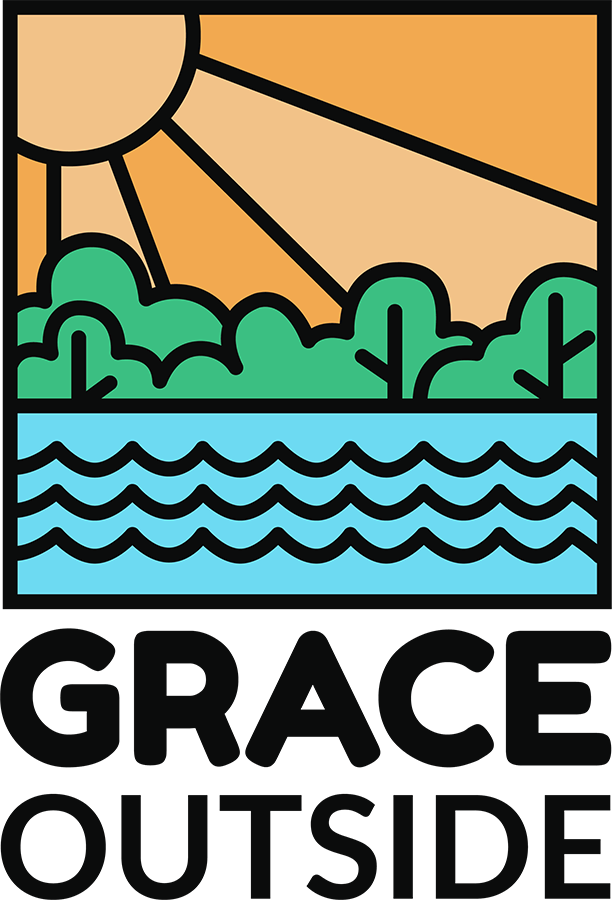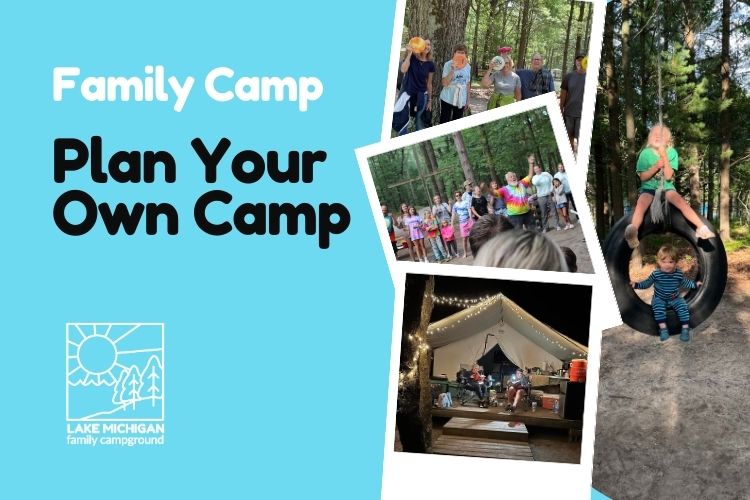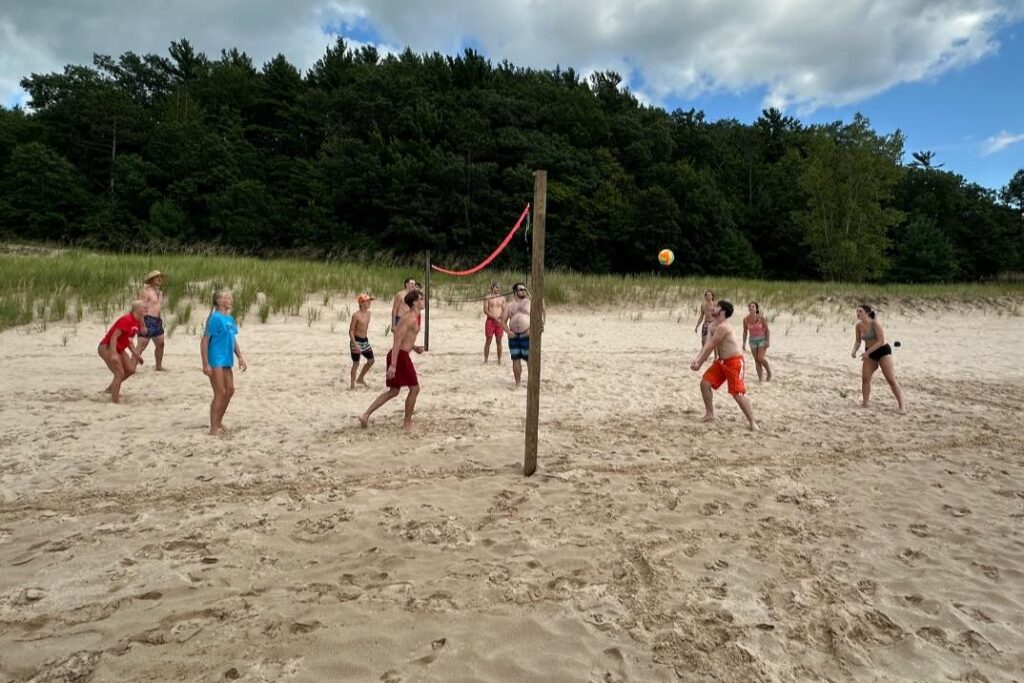
Jackson First UMC group camping enjoys the beach at Lake Michigan Family Campground
So you’re thinking about planning a Family Camp for your church or organization, but where to start? It’s OK to start small and allow your event to grow as word spreads about what a great time it is for families of all ages and sizes. Pray for inspiration at every step and you’ll be blessed with a new ministry that could change lives within your church, community and family.
[Below: read how one church has organized after 60 years of family camp.]
1. Preliminaries. Consider the variety of accommodations your group might use, including RV/tent sites with electric and water hookups (a few full hookup sites are available), platform “glamping tents,” bunk houses, retreat center and cabins. Use our online tool to search for availability by dates and type of accommodations. Call the campground to put a hold on dates/sites for your group. Pavilions are available for rent as well. Gather the names and contact information of interested families and spread the word on your family camp!
Lake Michigan Camp & Retreat
5807 N. Ridge Rd. Pentwater, MI 49449
231-869-5627
Erik Bengston, Director info@lakemichigancamp.org
2. Get Organized. Once your dates are secured, determine if you want to plan any programming such as games, activities, shared meals, worship or devotions. Determine how you want campers to register and pay for the event. Ask for volunteers to help and use their gifts and talents in ways that will make them excited to be a part of it. The more “stakeholders” you have in the event’s success, the better!
3. Publicize far and wide. Use all the resources of your congregation – announcements, bulletins/newsletters, flyers, posters, email, Facebook and website. Consider who your target audiences are (families, retirees, singles, or everyone) and tailor your message to them. Will you encourage campers to invite friends who are not regular attenders? What a great way to reach out in your community!
4. Pack Up & Go Camping! Finally! It’s time to go camping! Be prepared for all types of weather (it’s Michigan after all) and be ready for an amazing time with your camp family.
Links and Resources
We’ve curated some fun ideas for family camps, camping/rv tips, outdoor meals and more on Pinterest.
Social Media Help
Use our Promotional Resources page to find ready-to-use graphics
Use online tools like Canva.com to customize your own graphics.
Have questions or need help? Contact the site directors for group-planning and location-specific questions.
Have ideas to share to this page? Send them to marketing@graceoutside.org
Reflections of a Family Camper
Read a blog post by Terri Reynolds, a camper from Jackson First United Methodist Church, to understand why families spend a week camping together year after year. See part 2 of this post below, originally published in 2019.
60 Years of Family Camping!
By Terri Reynolds
Jackson First United Methodist Church has been holding its Family Camp at Lake Michigan Camp & Retreat since the late 1950s. It has grown over the years to include second, third, and fourth generations of families enjoying our mantra: Pray, Play, Camp, Repeat.
The Jackson group, now about 250-300 people, spend a week at the Lake Michigan campground every August.
For your first event, you won’t need to do things at the same scale, but you’ll get a sense of what types of things the Jackson group does to get organized, have fun and share their faith journey at camp.
A volunteer committee of 8 – 10 people from the church that meet once a month during the winter and spring. One of our pastors sits in on the committee when available. We try to limit the amount of work that falls onto our church staff so the committee handles registration, curriculum, activities, and communication. Our church treasurer processes payments for us. Church staff sends calls/emails on to us. We have a binder in the office for any paperwork or payments that come in when we aren’t meeting.
On the committee each member takes on a subcommittee or assignment which have included: Registration, Curriculum, Activities, Communion Supplies, T-Shirts, and Pancake Breakfast. In addition, we ask a camp member to lead our music for the week.
Leadership structure From our volunteer committee we select a Camp Dean. Once on site, the Camp Dean is available to the campground staff/director for communication/etc. Each day at camp a different committee member is a “Daily Duty Officer”. Our campers know to bring any problems to the daily officer and/or camp dean. This helps in a lot of ways — a daily officer helps alleviate some of the burden off the camp dean and the camp dean is the conduit through which we communicate any issues/problems/repair needs to the campground staff/director. [For example– if a showerhead is broken a camper will report that to the daily officer or the camp dean who will then take it to the Camp Director. Otherwise the camp director might have 20 people reporting the same problem.] Campers with announcements bring them to the camp dean or daily officer. None of our camp committee receive any compensation except for the camp dean. We agreed several years ago to absorb the camp site fee for the dean each year as a way of expressing thanks.
Theme The committee comes up with a theme for each year that we then use to focus our scripture/curriculum/activities. The theme for 2019 is Footprints (we’ll be looking at the footprints left by our faith ancestors, and the history of the camp through those that created and camped before us; where we “stand” now; and how we might be more intentional about what we are leaving as our faith (and environmental) legacy.
Past themes have included “Heart, Mind, Strength” using Deuteronomy 6; Pray, Play, Camp, Repeat; Go Fish using stories of fish in the Bible; God’s Family Tree using stories of our faith roots and our many branches.
Programming Our camp program begins at evening fire bowl on Sunday night and officially concludes at the end of the last fire bowl on Friday evening.
Fire bowl We gather as a camp around a fire bowl on Sunday, Monday, Tuesday, Wednesday, and Friday evenings and Monday, Tuesday, Wednesday, and Friday mornings. Our morning fire bowl is generally a time of singing together and then a brief devotional thought and introduction of the scripture(s) of the day. Campers are then released to peer classes on Monday, Tuesday, and Wednesday morning.
Our evening fire bowl time is more singing and a brief devotional. Over the years we’ve developed a camp song binder that has several versions printed and put into colorful report folders. Recently we laminated some, put them into comb bindings (so we can add to them as we go) and keep a milk crate at fire bowl filled with songbooks that can be used and returned.
Different groups present the day’s theme as an evening devotional. For example, our preK-2nd graders have a tradition of presenting a special song and dramatic retelling of our theme with costumes and wigs. Our high schoolers might present a skit. An adult might tell a story or share a testimony.
On Wednesday night fire bowl we take communion together. Our pastor leads us through the sacrament.
Curriculum We break our camp down this way: infants and toddlers, preK-2nd grade, 3rd-5th grades, middle school, high school, college and young adults, and adults.
Each group then dives deeper into the theme using the morning scripture as a launching pad. The infants and toddlers get supervised playtime with bubbles and chalk and outside toys allowing their parents a chance to be grown-ups with names again. Our younger kids learn more using arts and crafts and drama. Our middle schoolers often take on camp service projects. Our high school, college/YA, and adult groups (we have three adult groups to accommodate smaller classes) have a facilitator that helps keep the conversation focused.
Morning fire bowl and class are 1.5 to 2 hours in total.
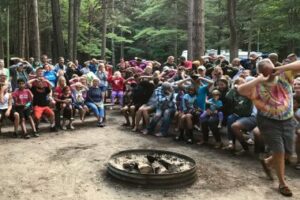
Silly songs are part of the fun at camp.
On Friday morning we break the whole camp into thirds so that whole families meet with other families. Families take what we’ve studied all week and begin to process together as family units how to incorporate this into our daily lives (or how to keep camp all year round). One year we each painted rocks that were our literal “touchstones” to keep in sight during the year. One year we did family credos. Last year we painted family trees with word branches reminding us of all the ways we feel God drawing us nearer.
A volunteer subcommittee puts together the curriculum materials (and any arts/crafts supplies that are needed). Each class leader has a plastic tote with everything they need. We mail out the curriculum in early summer to give class leaders a chance to read it over and add to it/test out activities.
We’re happy to share some of the curriculum materials we’ve written in the past as well as themes– contact Terri (see below)
Activities We plan a special activity for each evening. Some of our favorites include a Sunday night ice-breaker/welcome home party; dance in the pavilion (DJs are high school or college volunteers that make up an appropriate playlist. We use a lot of Disney and oldies songs); movie night (one of our campers sets up a screen on the baseball field); stargazing; scavenger hunts; capture-the-flag; an all-camp variety show; game night; euchre tournaments.
We try to incorporate a variety of energy levels, comfort levels with the campground itself, teams, individuals, etc.
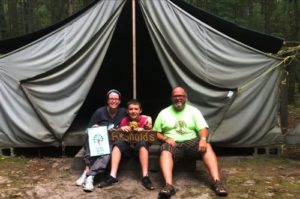 Our first fire bowl of the week is largely spent introducing all the families. New families are welcomed to camp with a wooden sign with their name to use as a site marker. (One of our campers generously donates his skills and materials to create these. They are beloved by our campers. It’s especially fun when a camp kid grows up, marries, and gets their own family sign.)
Our first fire bowl of the week is largely spent introducing all the families. New families are welcomed to camp with a wooden sign with their name to use as a site marker. (One of our campers generously donates his skills and materials to create these. They are beloved by our campers. It’s especially fun when a camp kid grows up, marries, and gets their own family sign.)
Work Projects We work with the camp to determine any work projects needed to help the facility itself. We have a handful of older campers who love directing the projects.
Free time We think it’s important to not overschedule our campers. For some this is their only family vacation of the year; so we make sure there is plenty of unscheduled time in the schedule. Every afternoon is free (the camp has a lovely beach), every evening activity is optional (many will just enjoy sitting around the campfire with their friends and family); Thursday is completely unscheduled (we offer an optional pancake breakfast that morning and encourage attendance at a sunset devotions on the dunes.) Many families head into nearby Pentwater for the free band concert or to Ludington to walk on the pier.
Meals We don’t do a camp kitchen (though we’ve heard some family camps do). In the early years of our Family Camp we used to do potluck suppers at camp. We also did bonfire suppers with “Hobo Pies” or hotdogs. Our camp has grown so large that it’s very difficult to coordinate an all-camp meal so we encourage campers to work with the sites around them to do group meals. We do have an annual fundraiser pancake breakfast at camp (we ask for any allergy considerations on camp registration forms so that we can accommodate any campers who are gluten-free, lactose intolerant, and others) that uses the camp kitchen and dining hall and our volunteers. We eat in shifts to accommodate the large number. Proceeds go toward the camp—allowing us to give back (and take a morning off cooking!)
Communication At camp we have daily announcements including family introductions, visitor introductions, campground rules, outings, activities, etc.
Throughout the year we stay in touch using social media. We have a group family camp Facebook page where we post funny pictures, campground announcements, Camping Sunday fundraisers, camp updates, etc. All of our camp families have at least one member using Facebook to help get information out to the rest of their campsite.
Camp Is Home One of the hallmarks of our Family Camp is the sense of home. Coming to Family Camp makes you part of the Family Camp family—so all ages are welcome. As the camp has grown we’ve taken on additional campers that might not worship with us on Sunday mornings at Jackson First. Many of our campers grew up in our church and then moved to other cities or states but come home for camp. Some are friends that attend other churches. For a few families this has become their church.
Participation We do, as a committee, strongly encourage 100% participation in our fire bowls and morning classes. We add a small amount to the camp site fees to cover the costs of any additional building rentals (for example, at Lake Michigan we also use the pavilion, craft hall, dining hall, and coolers). We charge a $15 program fee per campsite to help cover our craft and activity costs.
The bottom line is that this ministry strengthens the bonds between our campers, helps us grow in our faith, and creates a supportive faith community that has fostered new ministries and leadership within First UMC Jackson and our families and communities. Each year we conduct a survey at the end of camp and ask campers to describe camp in one word. We often see community, love, grace, relaxed, fun, and family on the list. When asked about the theme we consistently read that individuals found their faith renewed.
Terri is happy to answer questions or help you get started. Terri Reynolds, joughrey@gmail.com.
